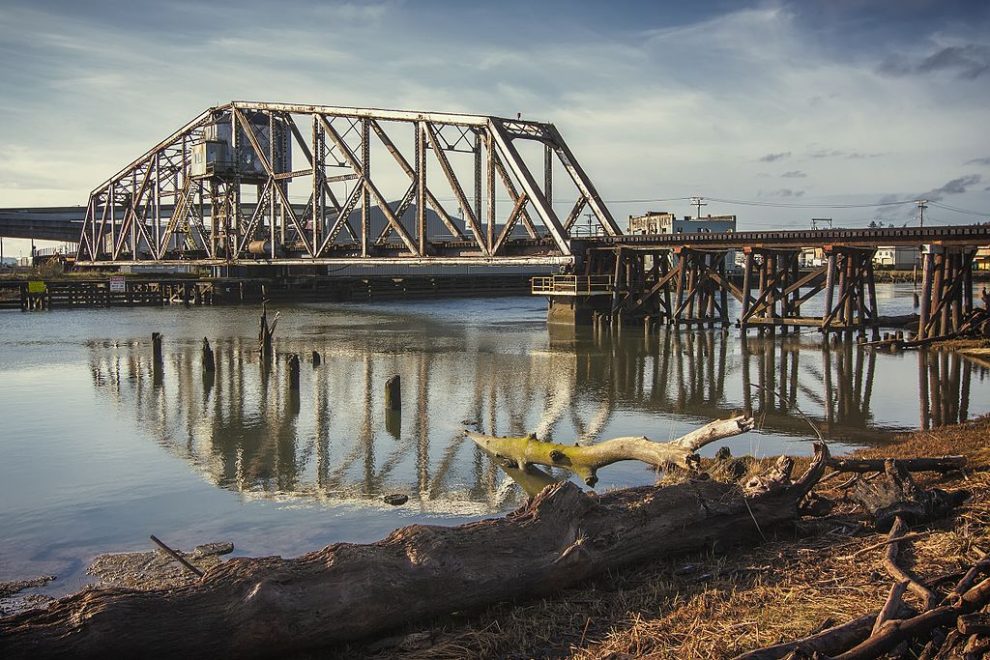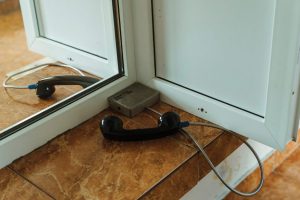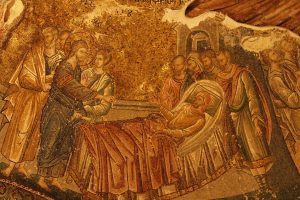“They say we are trash people. White trash.” So begins the new book Trash: A Poor White Journey (Broadleaf), written by Cedar Monroe. “It’s a fraught title, and it’s a way to bring attention to the slur ‘poor white trash’ and what people are talking about when they talk about poor white people in the United States,” Monroe says of the title to their book. “One of the themes in the book is that U.S. capitalism creates a system that treats people like trash. What would it look like to overturn this system?”

Part memoir and part an in-depth look at poor white communities in the United States, the book alternates between stories of Monroe’s own life and work in Grays Harbor County—a poor white rural community in Washington state—with history and statistics giving context to poverty nationwide.
“I’m really influenced by liberation theology and Latin American theologians such as Gustavo Gutiérrez and Jon Sobrino. That was my training in undergrad and in seminary: I spent time in Mexico and on the U.S.–Mexican border,” Monroe says. “Trash looks at what happens after that period in my life: I return to my community of origin on the coast of Washington state. Grays Harbor County, where I’m from, is about 70 percent white—at least officially. About half of the population qualifies for public assistance. The book is my analysis of my community and the work I did there as a chaplain for 10 years.”
Can you talk a little bit about the history of Grays Harbor and what this says about how little capitalism values people?
Nancy Isenberg wrote White Trash, a book that traces the 400-year history of poor white people in America. She builds this argument that throughout the American experiment there’s an idea of dumping Europe’s “waste” people or “trash” people into the American wilderness as a tool for settlement. I wanted to expand on that in my book a bit: Capitalism in the United States has used poor white people both as a tool for expanding settlement by promising them stolen land and as cannon fodder in pursuit of empire building.
Poor white people are constantly put in conflict with both Black people, who were brought to the United States as slaves, and Indigenous people, who the United States has dispossessed of land. Meanwhile, they are pushed further and further west over time until you get to my community. Growing up on the coast of Washington state, I always had the impression that people had been pushed all the way to the edge and there was nowhere left to go. There was no more “west.” There was no more promise of free land for settlers.
As the United States established itself very specifically as a colonial nation, one dedicated to driving out the “merciless Indian savages,” as it says in the Declaration of Independence, there was this impetus to move west in order to dispossess Indigenous nations and to take over and utilize the resources of the entire continent. It came out of the belief in manifest destiny—this idea that it was European Americans’ God-given right and responsibility to settle the continent. I think that’s still a powerful narrative, particularly for rural white people who have some connection to farming or land.
It was often poor white settlers who went west. But they were often not who got the majority of the land over time. Instead, corporations ended up controlling huge amounts of the land. In Grays Harbor, it was the timber industries, specifically Weyerhaeuser.
After the settlers moved to Washington in the 19th century, they created conflict with Indigenous people. In 1855, Indigenous nations were dispossessed in Washington state after the Puget Sound War and moved to reservations. All of this land was suddenly available. And then, in 1901, Weyerhaeuser bought up huge portions of Western Washington for $6 an acre. The U.S. government sold thousands of acres to this big corporation that took down thousands of years’ worth of old-growth forests. By 1911, only 10 years after Weyerhaeuser made that purchase, the Port of Grays Harbor was the largest timber exporter in the nation.
It’s a project, ultimately, that brought incredible wealth to American corporate interests. But it left Indigenous nations dispossessed. Grays Harbor County is surrounded by Native nations—the Quinault, Shoalwater Bay, and Chehalis. And even though today Indigenous people only make up about 2 percent of the Grays Harbor population, they account for a much larger percentage of the people who are homeless and on the street.
The sale of the land to Weyerhaeuser also left a huge number of people of all races in the lurch at the end of that project. This dispossession of Indigenous people laid the groundwork for a system of private property and dispossession for everyone who lives there. Eventually, there were no more old-growth forests and fewer trees to cut. During my lifetime we watched the timber industry fall, and there wasn’t really any replacement economy. People were just left sitting here. Today there aren’t enough jobs for people. One in 16 people are homeless in Aberdeen. And we have really high incarceration rates.
Your book deals with these really big topics of poverty and class but grounds them in the specific narrative of your hometown and even the details of your own life. Why did you decide to be so personal and vulnerable in your book?
Well, now that the book’s out, that’s a decision I’m second-guessing. But I think it’s important for me to talk about not only my own story as a working-class white person who grew up in this really poor community and came back to it, but also to tell the story of my community in the best way I know how.
The big picture is important. It’s important to talk about statistics and all those things. But I also wanted people to see just a sliver of what it looks like to live and survive in Grays Harbor County or in the city of Aberdeen.
I left the community, and when I returned a little less than a decade later I realized that a huge percentage of my generation had ended up in deep poverty. They lived on the streets, without jobs, and were heavily criminalized. People were living in tents lining the riverbanks in these horrific conditions and dying in horrific conditions in a community that had no way to offer them resources or the political will to even care. I buried so many people that I knew and loved, people who died of medical neglect, of overdoses, by suicide, and at the hands of police. They were dying in all these very preventable ways in the richest nation on Earth, in the heart of the so-called First World.
I’ve worked and organized throughout the United States enough to know that this is a reality replicated all over the country. When I drive through the Midwest and the South, I go through community after community that looks just like where I’m from. Conditions are bad everywhere. And they’re only getting worse post-COVID-19.
I wanted to make these conditions real to people. I wanted people to hear from young women losing their children and young people trapped in the prison system. I wanted people to attend funerals with me. I wanted them to hear from Indigenous folks losing family members over and over again, who are just constantly grieving the loss of their people. And I also wanted people to witness the courage and resilience I saw there. I wanted them to realize that perhaps the seeds of our liberation are actually in the poorest communities, in the leadership of people who are walking in the shadows of death in our country—or, as Gustavo Gutiérrez says, who experience poverty as early and unjust death—and where people are forced to struggle for survival.
How does religion play into poverty and whiteness in our country?
A lot of religious charity organizations in small towns have a very particular narrative. Often, in order to take advantage of their programs you have to engage in Bible studies or listen to sermons. The messaging is primarily that poverty and homelessness is an individual’s own fault. You’ve clearly made bad choices in your life. And the answer to poverty was Jesus: If you get Jesus in your life, you will get your life back on track, and you’ll be OK.
And, because drug addiction plays a huge part in homelessness and poverty, it became an evangelical Christian war against drug addiction and drug addicts with the messaging that if you convert or follow Jesus, everything will be OK.
I think that’s the dominant message poor white people internalize in the United States from our general religious culture. And, if you blame poor people individually for their failings, then we can bypass talking about the reasons why they’re poor or why a community is poor. And, in addition, religion becomes a source of shame. People get kicked out of church or asked to leave. The majority of people I worked with had negative experiences with the church, even those who were very devoutly Christian themselves.
This individualist message about poverty works to uphold capitalism and colonialism in the United States. The message of white supremacist culture is that poverty’s your fault and your struggles are your fault. If white people are superior, then poor white people throw a wrench in that narrative, and therefore there’s this sense of shame and that somehow they have failed both their community and whitness. I think the church reinforces that narrative through their very individualistic message of salvation.
I did this work as an ordained Episcopal priest and with a fair amount of funding from the Episcopal Church. I would say that in progressive religious spaces in general, there is at least a strand of theology that encourages people to help their community. There is some leaning toward social justice and a general consensus that helping poor people is a good thing. However, I think that the same narrative of blaming poor people for their poverty is just as much of a driving force in progressive churches as it is in evangelical ones.
I’ll also say that my experience with progressive churches is that when the rubber hits the road respectability politics is often a driving factor. Yes, in theory, they want poor people to be OK. Yes, in theory, they want social justice. But do they want homeless people in their church, camping on their property, or disrupting their space? Not really. Not unless poor people become respectable.
Now, there are many churches that host tent camps, shelters, or meal programs. I am super grateful for those that do; I think that churches represent some of the very little third space left in the United States. In a neoliberal economy, you have to pay to be everywhere; the only places you don’t have to pay to be are a church or the library. There’s really no other public space to be, and any kind of camping or sleeping outside is criminalized. A lot of my work in ministry was utilizing church space as that third space for people to be. That’s really powerful, and churches should be more aware of and utilize that.
We would often invoke the church as sanctuary space, especially for homeless people, who were extensively criminalized. We wouldn’t allow police in the building. We had mechanisms for working to ensure people’s safety and to create a space where people could not be criminalized and could relax and be who they were. That’s actually really radical in our time.
Progressive church spaces also tend to think in terms of charity: “We want to help these poor people.” That often prevents progressive people from seeing poor people as leaders in their own right and perfectly capable for participating in their own struggle for liberation.
Given all of that, do you think that the American church can be a force for liberation?
Any time the church can turn toward a narrative of a God who’s on the side of the poor and a Jesus who took the side of the poor, that’s a powerful thing. Organizations such as the Poor People’s Campaign are providing models for how to do this. But I also think that the church is very hesitant to confront the fact that the American church, writ large, has been part of the capitalist and colonial project from the beginning.
It was the American church that sponsored Indian boarding schools. It was the American church that gave the moral and theological justification for Western expansion and for the doctrine of discovery. The American church continues to support American individualism and this idea that you’re individually responsible for your fate. This idea upholds capitalism.
There are certainly minority voices within all sectors of the American church that do have a liberationist narrative. But I think the question will be whether the American church is ever willing to confront the fact that it created and supported the doctrine of discovery and its role in the building of the American empire and then to accept its responsibility to dismantle it. I don’t know that it ever will.
I saw in my community a decreasing belief that the church had any relevance to people’s struggle. I think that struggling people in the United States are not seeing the church step up to address their struggle and their reality. That’s not a good sign. If you believe that God is on the side of the poor and the poor don’t see the church on their side, I wonder what that says about the American church’s validity and future. I personally have stepped away from the church and have resigned my orders in the Episcopal Church, but that doesn’t mean that there’s no hope.
In your book, you tell so many stories about the financial and human resources spent on harming poor communities, including how the local police department drove a tank into a local tent camp. What would it look like to spend the same amount of resources on liberating these communities instead?
The United States has historically put militarism at the center of its budget. We think about that in terms of investing in foreign wars and military expansion, but it trickles down into communities, and so police departments across the country have access to huge amounts of military equipment.
Added to that is this sense that as there are more and more poor people, civil order starts breaking down. And the response to that has consistently been increased militarization, increased security, increased repression, and increased expansion of prisons. And yeah, this takes a huge amount of resources. And there are so little resources going toward any constructive responses to the problem of poverty. For example, the United States defunded housing development in the 1980s, and we haven’t built public housing since. Now the only option for poor people is housing vouchers, which shores up the rental market; it’s not a sustainable way to house people.
The Poor People’s Campaign put forward a moral budget where it did ask that exact question: What would happen if we used this huge chunk of money that’s currently going toward increasing law and order and instead diverted that into making sure people had housing and health care as well as access to food, clothing, shelter, education, and other basic needs?
Doing that solves other problems, too. Housing and social supports can solve homelessness. Medical care and treatment access can solve addiction. There’s this great example in the book: Grays Harbor had, for 40 years, really intensely invested in incarceration. Until finally, a judge managed to find funding for a very small drug treatment and diversion program in the county jail. Instead of being sent to prison for drug offenses, people were given complete wraparound services. They received housing, health care, treatment, and job training. That completely changed a segment of the community: Instead of paying for them to be incarcerated, all that money went toward helping them get back on their feet. If we did that on a large scale, a lot would change.
Do you think we’ll get there?
You can’t have half your population struggling in poverty forever without consequences. But what will happen I think depends on the American political will. Right now we see hardly any political will toward any kind of social programs or social nets. And this isn’t a partisan issue: Some of the largest dismantling of social services happened under the Clinton administration.
While we have very basic civil rights in our Constitution, we have no given economic rights. The only phrase in our founding documents is that we have the right to life: there’s literally nothing in law giving us the rights that actually make life possible—things like housing, education, and health care. Those rights are not enshrined in our Constitution and not part of the national conversation at all. So much so that I’ve been to city council or county commissioner meetings where people will say things like, “If people aren’t working, why do they have the right to be in a house?” Obviously this shows a vast ignorance of why people aren’t working and why they don’t have what they need to survive. But also there’s this fundamental belief in the United States that you don’t have the right to the things we need to stay alive. I think this needs to be part of our conversation—why don’t we have these rights?
How do you convince people that ending poverty is in everyone’s best interest?
A lot of the anti-homeless organizing comes from groups of people who have small businesses and don’t want people camping in front of their businesses or who are property owners and don’t want people to strip the copper wire out of their buildings. Sometimes the property owners aren’t actually doing all that well themselves, but they still have something invested and something left to lose. I think that some of them, especially those who have struggled themselves, are often probably functioning out of their own sense of anxiety.
Things aren’t going all that well in the United States for most people, so there’s a lot of anxiety. When people act out of their own anxiety, they will do whatever it takes for their own survival. Capitalism is great at harnessing people’s anger and fear toward another group of people. It’s the time-honored American way to punch down. I think trying to reach these people with a different narrative is important, along with better education and more political mobilization.
One of my takeaways from liberation theology and from organizing in Central and South America and throughout the global South is that poor people are the best leaders for their own liberation. I’m very invested in educating poor people about why they’re poor and around strategies to end poverty in the United States, because I really do think that poor people are their own leaders. I do think that the path toward liberation is through the leadership of the poor themselves.
Maybe it’s because I’m from Washington state, where Indigenous nations have a growing amount of power and have done a lot of their own organizing for their own rights, but I think a piece of that is recognition of Indigenous sovereignty.
For example, the city of Aberdeen is very uninvested in doing really much of anything to support poor people. Year after year, every time we tried to bring in a shelter or treatment center, we were shot down or sabotaged by city officials. But the Quinault Indian Nation came in and funded a $20 million treatment center themselves that is open to both Indigenous and non-Indigenous people. They created this full wraparound program that offers treatment, counseling, medical and dental care, and all kinds of support services. That has been a huge point of help for the community, but also a way for poor people to get the things that they need and to start educating themselves. The Quinault Indian Nation has also done similar things around environmental issues such as the endangered salmon population and rising sea levels.
Looking toward the leadership of poor people themselves, poor Black communities who have organized for the last 400 or 500 years in this country, and Indigenous people who have resisted American empire for the last 500 years and are now taking back their language and culture and sovereignty, I think that’s where our hope lies. Not necessarily within the political systems that have been set up in a settler economy. Our hope lies in the leadership of people who actually have skin in the game.
This article also appears in the May 2024 issue of U.S. Catholic (Vol. 89, No. 5, pages 16-20). Click here to subscribe to the magazine.
Image: via Wikimedia Commons












Add comment